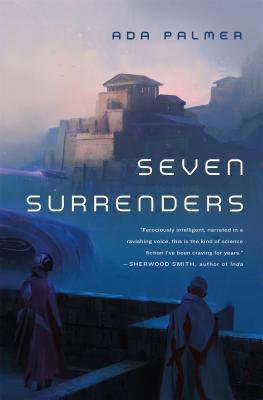Upfront, I had a hard time with Too Like the Lightning, the first book in this series. The narrative style was something that just felt too white-centered and it brought up some awful college memories and bleh. I just wasn’t feeling it. But I am happy to say that the sequel read much better and was a far more enjoyable work. The veil really gets pulled back on the utopia this time and there are some really deep philosophical struggles going on in this book. There are places throughout the book where I found myself questioning my own ethical limits and having to ponder on what side of the coin I would really fall in regards to issues of peace and what has to be done to maintain it.
There is essentially a larger conspiracy at work in this book and the easiest way for me to explain would be to take it back to Captain America: Winter Soldier. Remember how in that movie, HYDRA was going to use a system that would target and take out everyone that would present even a potential problem to their agenda? Well, the utopia in this book is revealed to have only survived through such a devious system. Some two thousand odd people over the course of three hundred years have been removed to maintain world peace. In all pragmatic honesty, that doesn’t seem to be such a bad proposition.
This is the primary questions you find yourself having to combat with during the course of the novel. Is a peace constructed and maintained by murder really a true peace? Is a nobility of principles really enough to justify tearing down such a peace once discovered? For the first question, I want to say yes because on the surface it seems easy. For the second question, I want to say no because on the surface it seems a callous thing to do. But this is when you have to change the lens from which you’re viewing the questions. And this novel does change the lens up on you enough times to make you think about the wider implications of such a system.
But with that said, this book seems to have a laser focus on the powerful and the mighty in this world. I really don’t have a solid idea of what life is like for a normal person in this society. What’s the life of an accountant like? Are there even accountants? What do schools look like for your average child? I think having those things answered at least somewhat would have made the looming specter of war in this novel that much more poignant. A lot of numbers were dropped during the course of it, but I don’t feel like there’s any real humanity behind the data.
One of my wider issues with the book outside of these ethical questions (which I enjoyed), is how it handles sexuality. Throughout the book, I find there to be a very troubling correlation between people who are free and experimental with their sexuality to those who are unscrupulous and think of common society being beneath them. A sex cult of the rich and powerful draws up a lot of Illuminati conspiracy theory rhetoric for me. In the African-American community, my touch point, this rhetoric is usually used as justification for homophobia and degradation of sexual freedom. I’m not accusing the author of any of these things of course, but there are some uncomfortable implications in the work that made me itch. There is always a running trope in media of having people who are experimental and fluid with their sexuality being less than noble and somehow either soulless or unpredictable wildcards. In my own personal experience, I find it to be the complete opposite so often. So I hope future books might examine that a little more closely.
That’s what I hope becomes a goal of this series moving forward. Inject humanity into the big ideas. I have no problem wrestling with questions of philosophy, but I would like to see a face put to them. Give the questions even more weight than they already have.
You can find Ada Palmer’s SEVEN SURRENDERS at https://www.amazon.com/Seven-Surrenders-Novel-Terra-Ignota/dp/0765378027

